Core Principles of Mortgage and Remedies for Mortgagee
VerifiedAdded on 2023/01/18
|12
|3184
|44
AI Summary
This article discusses the core principles of mortgage and the remedies available to the mortgagee in case of non-payment of debt. It covers the nature of mortgage, legal formalities, and various remedies such as power of sale, power of possession, power of foreclosure, power to appoint a receiver, and the right to sue.
Contribute Materials
Your contribution can guide someone’s learning journey. Share your
documents today.
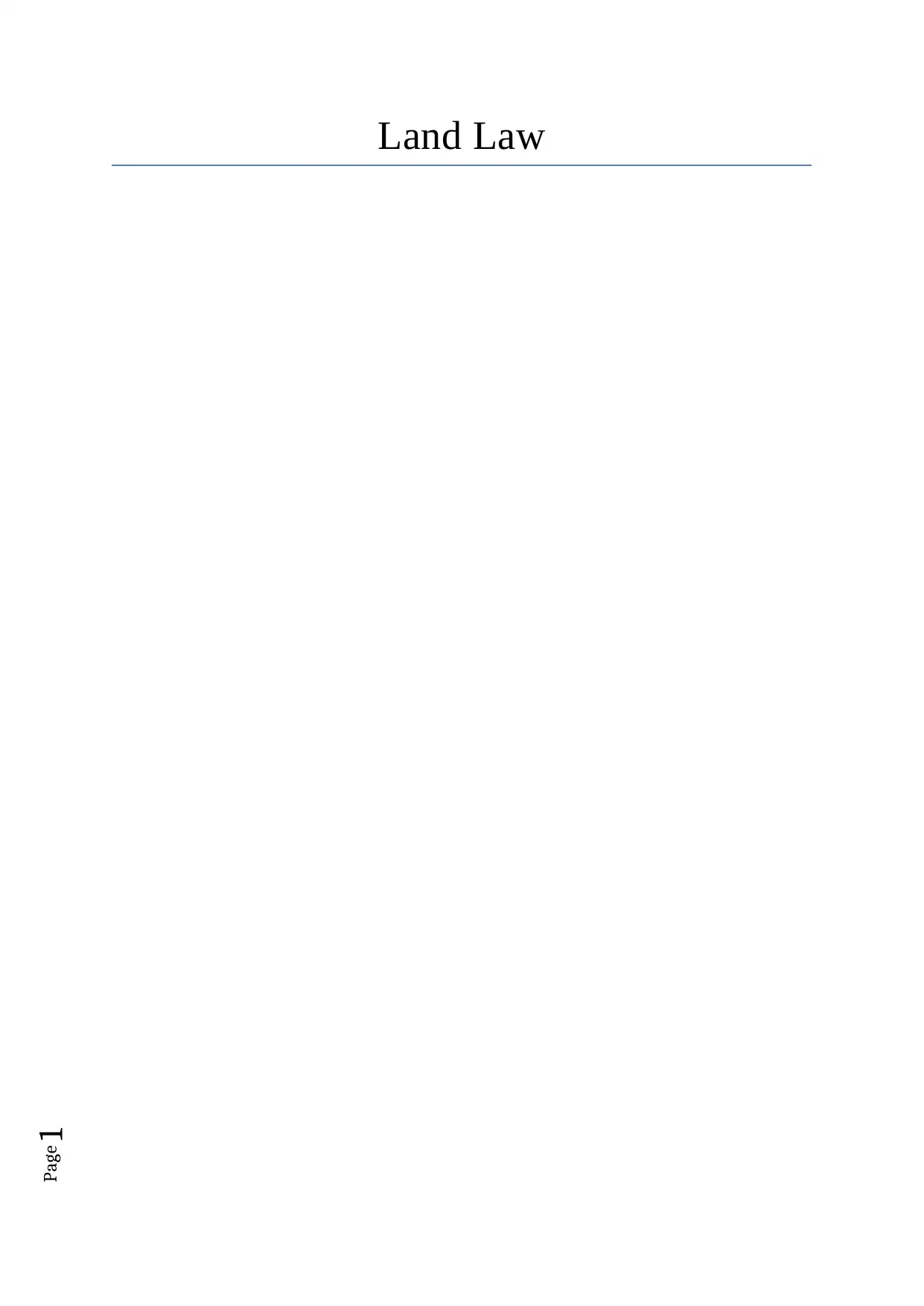
Page1
Land Law
Land Law
Secure Best Marks with AI Grader
Need help grading? Try our AI Grader for instant feedback on your assignments.
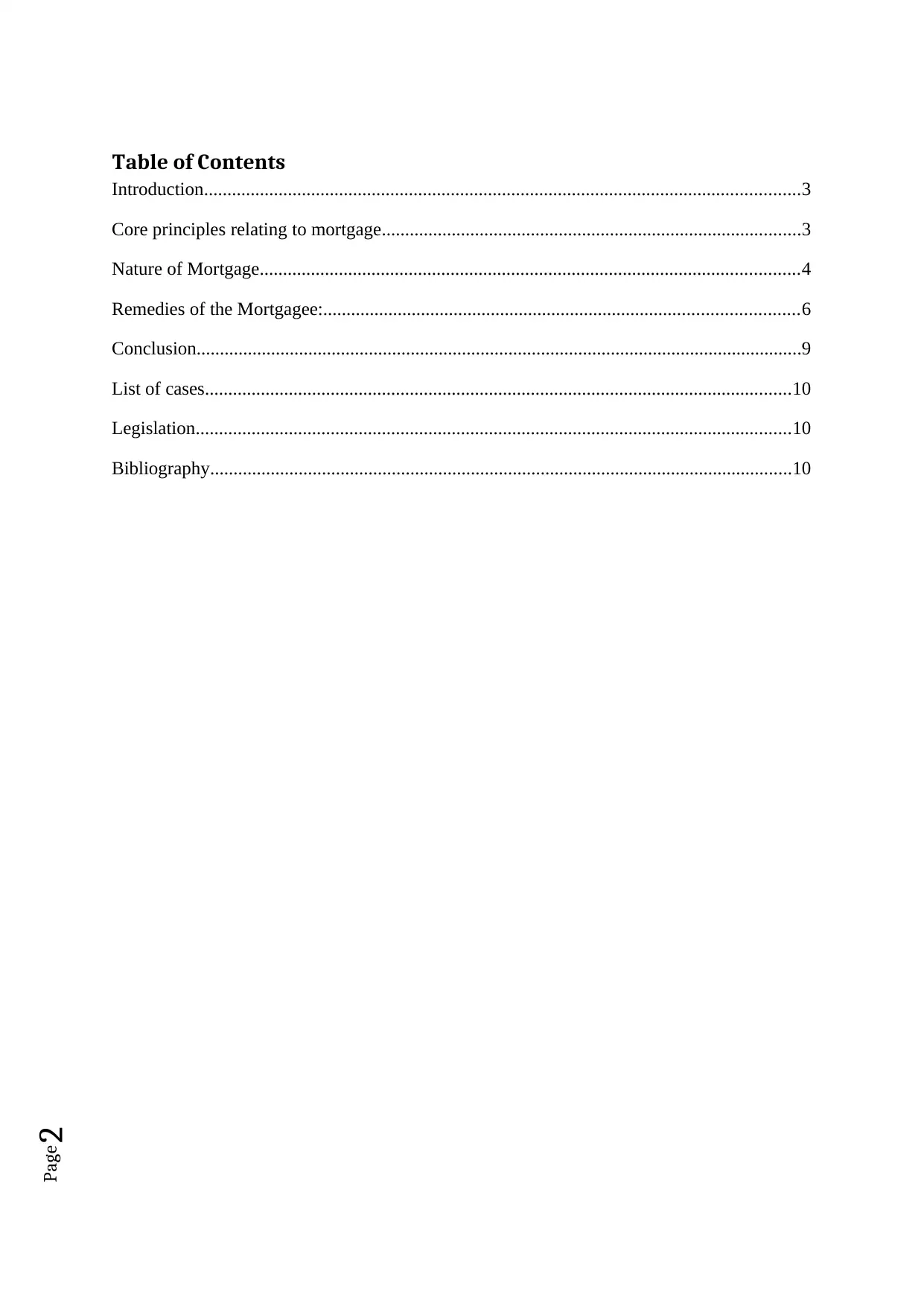
Page2
Table of Contents
Introduction................................................................................................................................3
Core principles relating to mortgage..........................................................................................3
Nature of Mortgage....................................................................................................................4
Remedies of the Mortgagee:......................................................................................................6
Conclusion..................................................................................................................................9
List of cases..............................................................................................................................10
Legislation................................................................................................................................10
Bibliography.............................................................................................................................10
Table of Contents
Introduction................................................................................................................................3
Core principles relating to mortgage..........................................................................................3
Nature of Mortgage....................................................................................................................4
Remedies of the Mortgagee:......................................................................................................6
Conclusion..................................................................................................................................9
List of cases..............................................................................................................................10
Legislation................................................................................................................................10
Bibliography.............................................................................................................................10
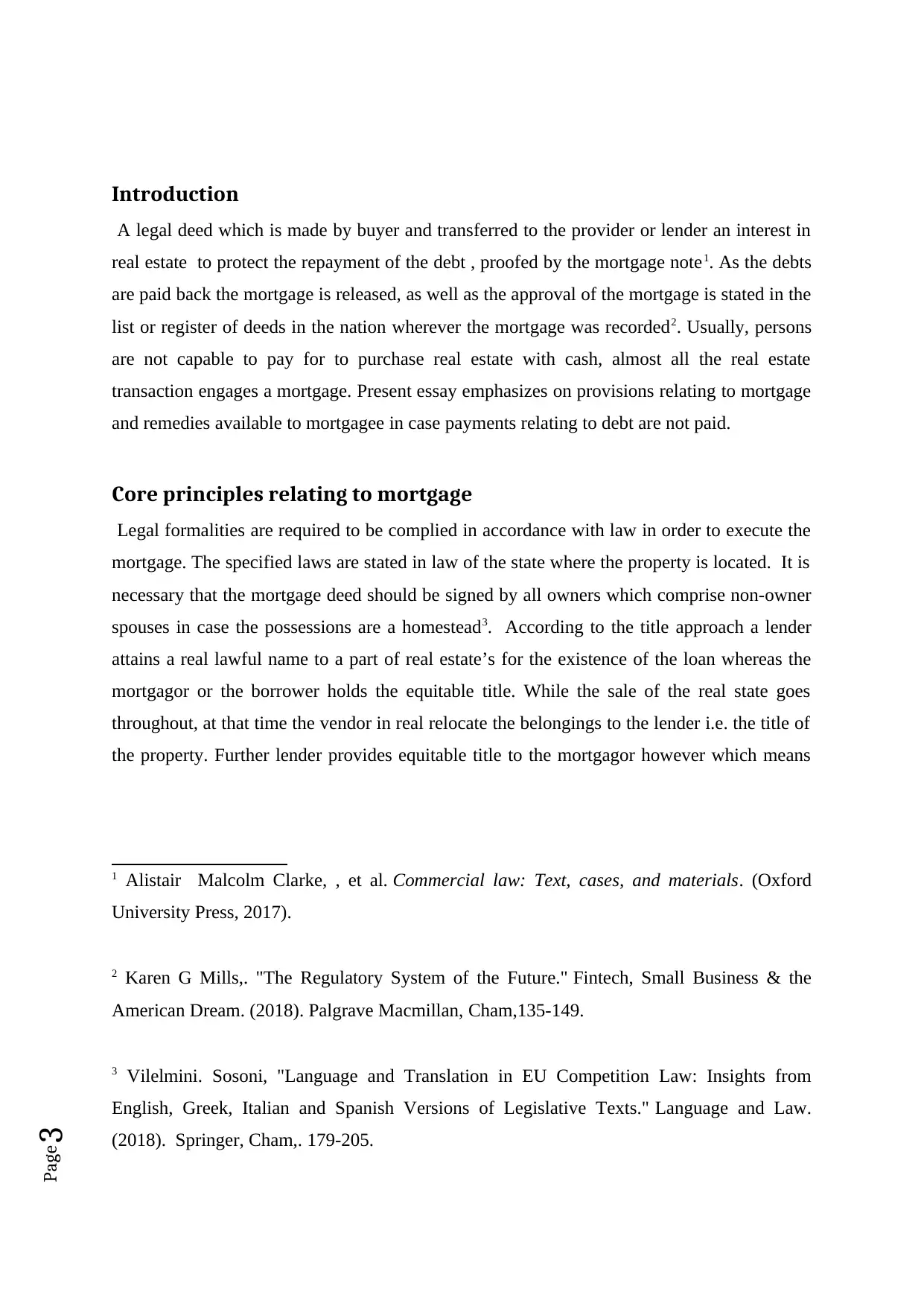
Page3
Introduction
A legal deed which is made by buyer and transferred to the provider or lender an interest in
real estate to protect the repayment of the debt , proofed by the mortgage note1. As the debts
are paid back the mortgage is released, as well as the approval of the mortgage is stated in the
list or register of deeds in the nation wherever the mortgage was recorded2. Usually, persons
are not capable to pay for to purchase real estate with cash, almost all the real estate
transaction engages a mortgage. Present essay emphasizes on provisions relating to mortgage
and remedies available to mortgagee in case payments relating to debt are not paid.
Core principles relating to mortgage
Legal formalities are required to be complied in accordance with law in order to execute the
mortgage. The specified laws are stated in law of the state where the property is located. It is
necessary that the mortgage deed should be signed by all owners which comprise non-owner
spouses in case the possessions are a homestead3. According to the title approach a lender
attains a real lawful name to a part of real estate’s for the existence of the loan whereas the
mortgagor or the borrower holds the equitable title. While the sale of the real state goes
throughout, at that time the vendor in real relocate the belongings to the lender i.e. the title of
the property. Further lender provides equitable title to the mortgagor however which means
1 Alistair Malcolm Clarke, , et al. Commercial law: Text, cases, and materials. (Oxford
University Press, 2017).
2 Karen G Mills,. "The Regulatory System of the Future." Fintech, Small Business & the
American Dream. (2018). Palgrave Macmillan, Cham,135-149.
3 Vilelmini. Sosoni, "Language and Translation in EU Competition Law: Insights from
English, Greek, Italian and Spanish Versions of Legislative Texts." Language and Law.
(2018). Springer, Cham,. 179-205.
Introduction
A legal deed which is made by buyer and transferred to the provider or lender an interest in
real estate to protect the repayment of the debt , proofed by the mortgage note1. As the debts
are paid back the mortgage is released, as well as the approval of the mortgage is stated in the
list or register of deeds in the nation wherever the mortgage was recorded2. Usually, persons
are not capable to pay for to purchase real estate with cash, almost all the real estate
transaction engages a mortgage. Present essay emphasizes on provisions relating to mortgage
and remedies available to mortgagee in case payments relating to debt are not paid.
Core principles relating to mortgage
Legal formalities are required to be complied in accordance with law in order to execute the
mortgage. The specified laws are stated in law of the state where the property is located. It is
necessary that the mortgage deed should be signed by all owners which comprise non-owner
spouses in case the possessions are a homestead3. According to the title approach a lender
attains a real lawful name to a part of real estate’s for the existence of the loan whereas the
mortgagor or the borrower holds the equitable title. While the sale of the real state goes
throughout, at that time the vendor in real relocate the belongings to the lender i.e. the title of
the property. Further lender provides equitable title to the mortgagor however which means
1 Alistair Malcolm Clarke, , et al. Commercial law: Text, cases, and materials. (Oxford
University Press, 2017).
2 Karen G Mills,. "The Regulatory System of the Future." Fintech, Small Business & the
American Dream. (2018). Palgrave Macmillan, Cham,135-149.
3 Vilelmini. Sosoni, "Language and Translation in EU Competition Law: Insights from
English, Greek, Italian and Spanish Versions of Legislative Texts." Language and Law.
(2018). Springer, Cham,. 179-205.
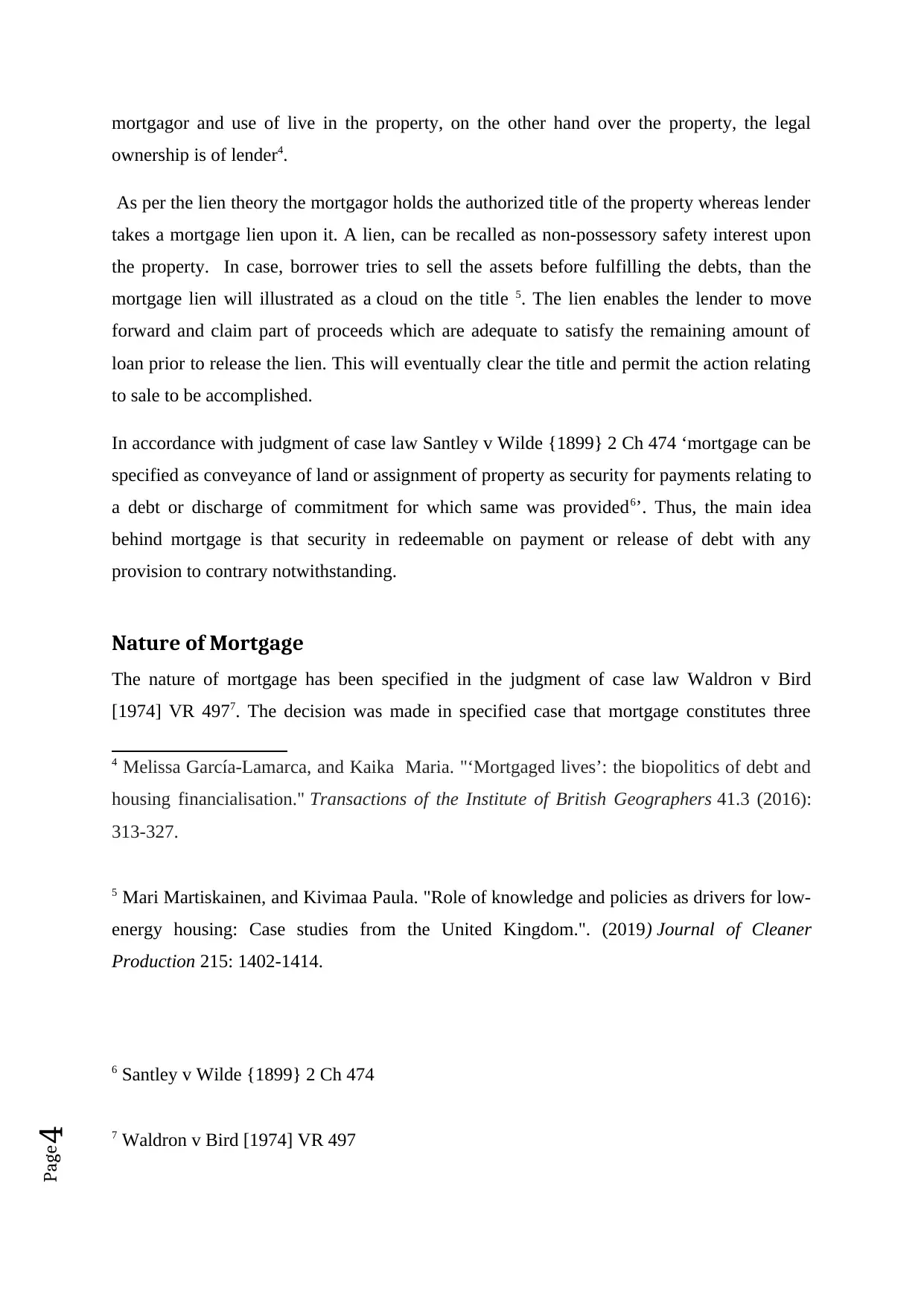
Page4
mortgagor and use of live in the property, on the other hand over the property, the legal
ownership is of lender4.
As per the lien theory the mortgagor holds the authorized title of the property whereas lender
takes a mortgage lien upon it. A lien, can be recalled as non-possessory safety interest upon
the property. In case, borrower tries to sell the assets before fulfilling the debts, than the
mortgage lien will illustrated as a cloud on the title 5. The lien enables the lender to move
forward and claim part of proceeds which are adequate to satisfy the remaining amount of
loan prior to release the lien. This will eventually clear the title and permit the action relating
to sale to be accomplished.
In accordance with judgment of case law Santley v Wilde {1899} 2 Ch 474 ‘mortgage can be
specified as conveyance of land or assignment of property as security for payments relating to
a debt or discharge of commitment for which same was provided6’. Thus, the main idea
behind mortgage is that security in redeemable on payment or release of debt with any
provision to contrary notwithstanding.
Nature of Mortgage
The nature of mortgage has been specified in the judgment of case law Waldron v Bird
[1974] VR 4977. The decision was made in specified case that mortgage constitutes three
4 Melissa García‐Lamarca, and Kaika Maria. "‘Mortgaged lives’: the biopolitics of debt and
housing financialisation." Transactions of the Institute of British Geographers 41.3 (2016):
313-327.
5 Mari Martiskainen, and Kivimaa Paula. "Role of knowledge and policies as drivers for low-
energy housing: Case studies from the United Kingdom.". (2019) Journal of Cleaner
Production 215: 1402-1414.
6 Santley v Wilde {1899} 2 Ch 474
7 Waldron v Bird [1974] VR 497
mortgagor and use of live in the property, on the other hand over the property, the legal
ownership is of lender4.
As per the lien theory the mortgagor holds the authorized title of the property whereas lender
takes a mortgage lien upon it. A lien, can be recalled as non-possessory safety interest upon
the property. In case, borrower tries to sell the assets before fulfilling the debts, than the
mortgage lien will illustrated as a cloud on the title 5. The lien enables the lender to move
forward and claim part of proceeds which are adequate to satisfy the remaining amount of
loan prior to release the lien. This will eventually clear the title and permit the action relating
to sale to be accomplished.
In accordance with judgment of case law Santley v Wilde {1899} 2 Ch 474 ‘mortgage can be
specified as conveyance of land or assignment of property as security for payments relating to
a debt or discharge of commitment for which same was provided6’. Thus, the main idea
behind mortgage is that security in redeemable on payment or release of debt with any
provision to contrary notwithstanding.
Nature of Mortgage
The nature of mortgage has been specified in the judgment of case law Waldron v Bird
[1974] VR 4977. The decision was made in specified case that mortgage constitutes three
4 Melissa García‐Lamarca, and Kaika Maria. "‘Mortgaged lives’: the biopolitics of debt and
housing financialisation." Transactions of the Institute of British Geographers 41.3 (2016):
313-327.
5 Mari Martiskainen, and Kivimaa Paula. "Role of knowledge and policies as drivers for low-
energy housing: Case studies from the United Kingdom.". (2019) Journal of Cleaner
Production 215: 1402-1414.
6 Santley v Wilde {1899} 2 Ch 474
7 Waldron v Bird [1974] VR 497
Secure Best Marks with AI Grader
Need help grading? Try our AI Grader for instant feedback on your assignments.
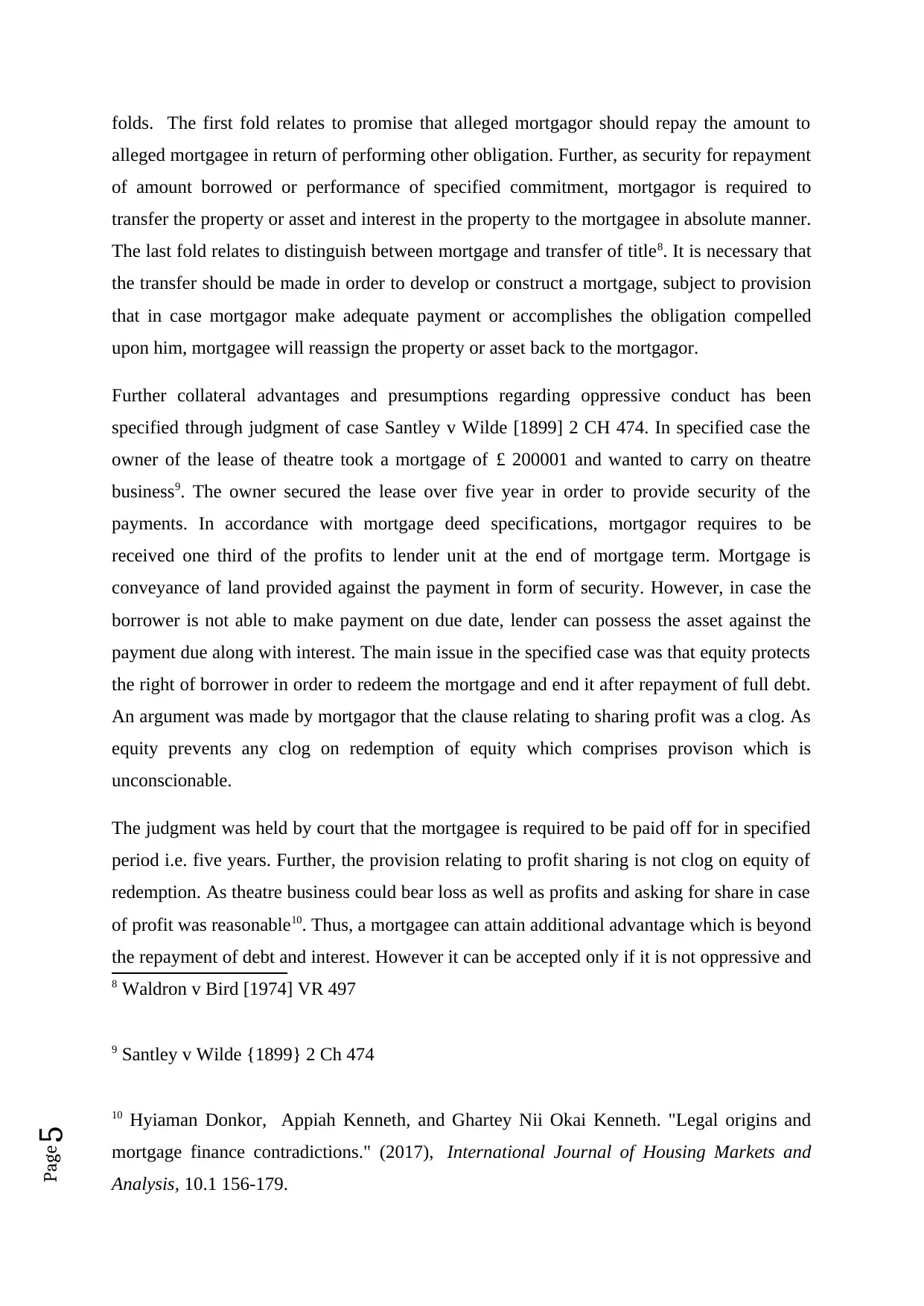
Page5
folds. The first fold relates to promise that alleged mortgagor should repay the amount to
alleged mortgagee in return of performing other obligation. Further, as security for repayment
of amount borrowed or performance of specified commitment, mortgagor is required to
transfer the property or asset and interest in the property to the mortgagee in absolute manner.
The last fold relates to distinguish between mortgage and transfer of title8. It is necessary that
the transfer should be made in order to develop or construct a mortgage, subject to provision
that in case mortgagor make adequate payment or accomplishes the obligation compelled
upon him, mortgagee will reassign the property or asset back to the mortgagor.
Further collateral advantages and presumptions regarding oppressive conduct has been
specified through judgment of case Santley v Wilde [1899] 2 CH 474. In specified case the
owner of the lease of theatre took a mortgage of £ 200001 and wanted to carry on theatre
business9. The owner secured the lease over five year in order to provide security of the
payments. In accordance with mortgage deed specifications, mortgagor requires to be
received one third of the profits to lender unit at the end of mortgage term. Mortgage is
conveyance of land provided against the payment in form of security. However, in case the
borrower is not able to make payment on due date, lender can possess the asset against the
payment due along with interest. The main issue in the specified case was that equity protects
the right of borrower in order to redeem the mortgage and end it after repayment of full debt.
An argument was made by mortgagor that the clause relating to sharing profit was a clog. As
equity prevents any clog on redemption of equity which comprises provison which is
unconscionable.
The judgment was held by court that the mortgagee is required to be paid off for in specified
period i.e. five years. Further, the provision relating to profit sharing is not clog on equity of
redemption. As theatre business could bear loss as well as profits and asking for share in case
of profit was reasonable10. Thus, a mortgagee can attain additional advantage which is beyond
the repayment of debt and interest. However it can be accepted only if it is not oppressive and
8 Waldron v Bird [1974] VR 497
9 Santley v Wilde {1899} 2 Ch 474
10 Hyiaman Donkor, Appiah Kenneth, and Ghartey Nii Okai Kenneth. "Legal origins and
mortgage finance contradictions." (2017), International Journal of Housing Markets and
Analysis, 10.1 156-179.
folds. The first fold relates to promise that alleged mortgagor should repay the amount to
alleged mortgagee in return of performing other obligation. Further, as security for repayment
of amount borrowed or performance of specified commitment, mortgagor is required to
transfer the property or asset and interest in the property to the mortgagee in absolute manner.
The last fold relates to distinguish between mortgage and transfer of title8. It is necessary that
the transfer should be made in order to develop or construct a mortgage, subject to provision
that in case mortgagor make adequate payment or accomplishes the obligation compelled
upon him, mortgagee will reassign the property or asset back to the mortgagor.
Further collateral advantages and presumptions regarding oppressive conduct has been
specified through judgment of case Santley v Wilde [1899] 2 CH 474. In specified case the
owner of the lease of theatre took a mortgage of £ 200001 and wanted to carry on theatre
business9. The owner secured the lease over five year in order to provide security of the
payments. In accordance with mortgage deed specifications, mortgagor requires to be
received one third of the profits to lender unit at the end of mortgage term. Mortgage is
conveyance of land provided against the payment in form of security. However, in case the
borrower is not able to make payment on due date, lender can possess the asset against the
payment due along with interest. The main issue in the specified case was that equity protects
the right of borrower in order to redeem the mortgage and end it after repayment of full debt.
An argument was made by mortgagor that the clause relating to sharing profit was a clog. As
equity prevents any clog on redemption of equity which comprises provison which is
unconscionable.
The judgment was held by court that the mortgagee is required to be paid off for in specified
period i.e. five years. Further, the provision relating to profit sharing is not clog on equity of
redemption. As theatre business could bear loss as well as profits and asking for share in case
of profit was reasonable10. Thus, a mortgagee can attain additional advantage which is beyond
the repayment of debt and interest. However it can be accepted only if it is not oppressive and
8 Waldron v Bird [1974] VR 497
9 Santley v Wilde {1899} 2 Ch 474
10 Hyiaman Donkor, Appiah Kenneth, and Ghartey Nii Okai Kenneth. "Legal origins and
mortgage finance contradictions." (2017), International Journal of Housing Markets and
Analysis, 10.1 156-179.
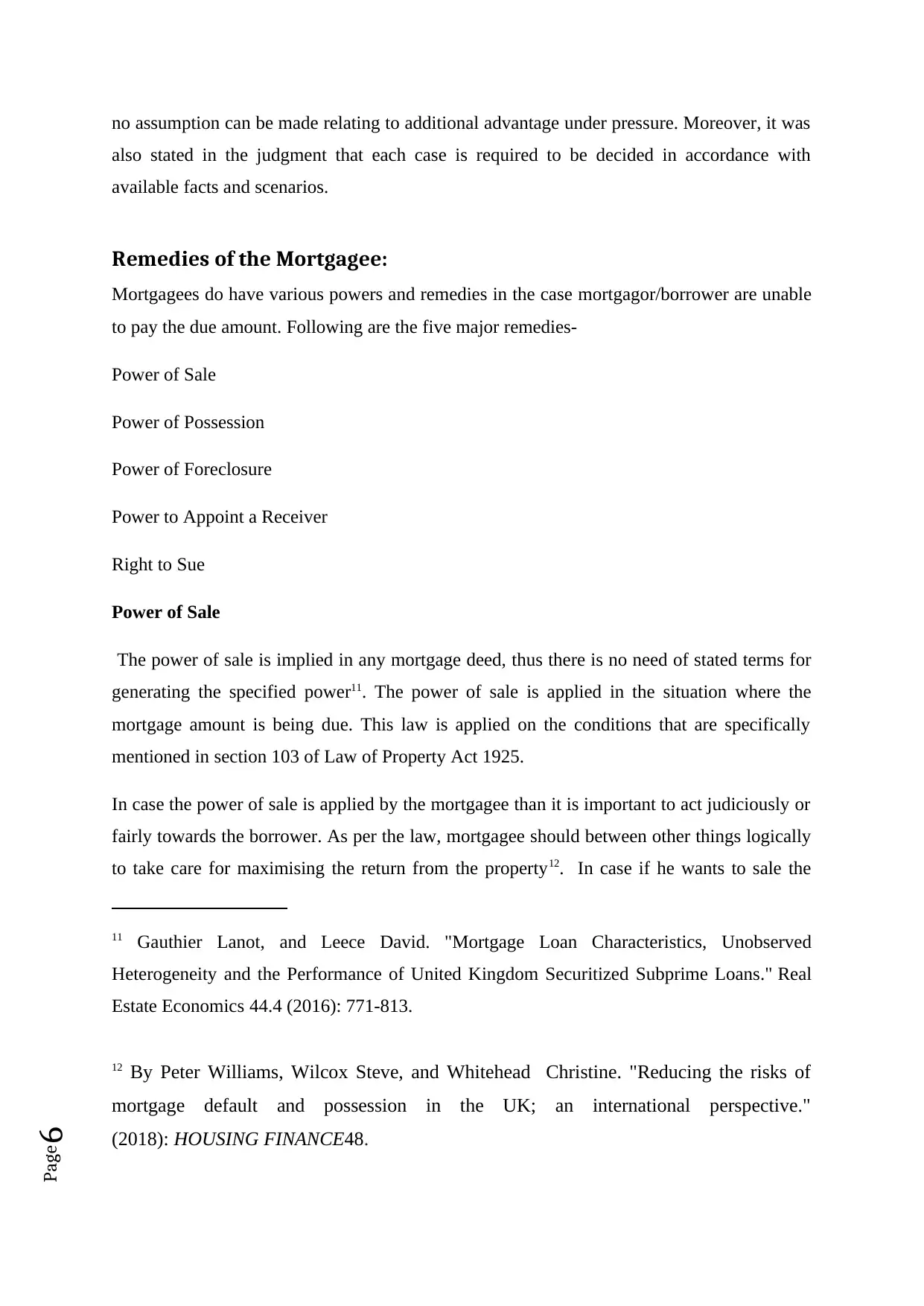
Page6
no assumption can be made relating to additional advantage under pressure. Moreover, it was
also stated in the judgment that each case is required to be decided in accordance with
available facts and scenarios.
Remedies of the Mortgagee:
Mortgagees do have various powers and remedies in the case mortgagor/borrower are unable
to pay the due amount. Following are the five major remedies-
Power of Sale
Power of Possession
Power of Foreclosure
Power to Appoint a Receiver
Right to Sue
Power of Sale
The power of sale is implied in any mortgage deed, thus there is no need of stated terms for
generating the specified power11. The power of sale is applied in the situation where the
mortgage amount is being due. This law is applied on the conditions that are specifically
mentioned in section 103 of Law of Property Act 1925.
In case the power of sale is applied by the mortgagee than it is important to act judiciously or
fairly towards the borrower. As per the law, mortgagee should between other things logically
to take care for maximising the return from the property12. In case if he wants to sale the
11 Gauthier Lanot, and Leece David. "Mortgage Loan Characteristics, Unobserved
Heterogeneity and the Performance of United Kingdom Securitized Subprime Loans." Real
Estate Economics 44.4 (2016): 771-813.
12 By Peter Williams, Wilcox Steve, and Whitehead Christine. "Reducing the risks of
mortgage default and possession in the UK; an international perspective."
(2018): HOUSING FINANCE48.
no assumption can be made relating to additional advantage under pressure. Moreover, it was
also stated in the judgment that each case is required to be decided in accordance with
available facts and scenarios.
Remedies of the Mortgagee:
Mortgagees do have various powers and remedies in the case mortgagor/borrower are unable
to pay the due amount. Following are the five major remedies-
Power of Sale
Power of Possession
Power of Foreclosure
Power to Appoint a Receiver
Right to Sue
Power of Sale
The power of sale is implied in any mortgage deed, thus there is no need of stated terms for
generating the specified power11. The power of sale is applied in the situation where the
mortgage amount is being due. This law is applied on the conditions that are specifically
mentioned in section 103 of Law of Property Act 1925.
In case the power of sale is applied by the mortgagee than it is important to act judiciously or
fairly towards the borrower. As per the law, mortgagee should between other things logically
to take care for maximising the return from the property12. In case if he wants to sale the
11 Gauthier Lanot, and Leece David. "Mortgage Loan Characteristics, Unobserved
Heterogeneity and the Performance of United Kingdom Securitized Subprime Loans." Real
Estate Economics 44.4 (2016): 771-813.
12 By Peter Williams, Wilcox Steve, and Whitehead Christine. "Reducing the risks of
mortgage default and possession in the UK; an international perspective."
(2018): HOUSING FINANCE48.
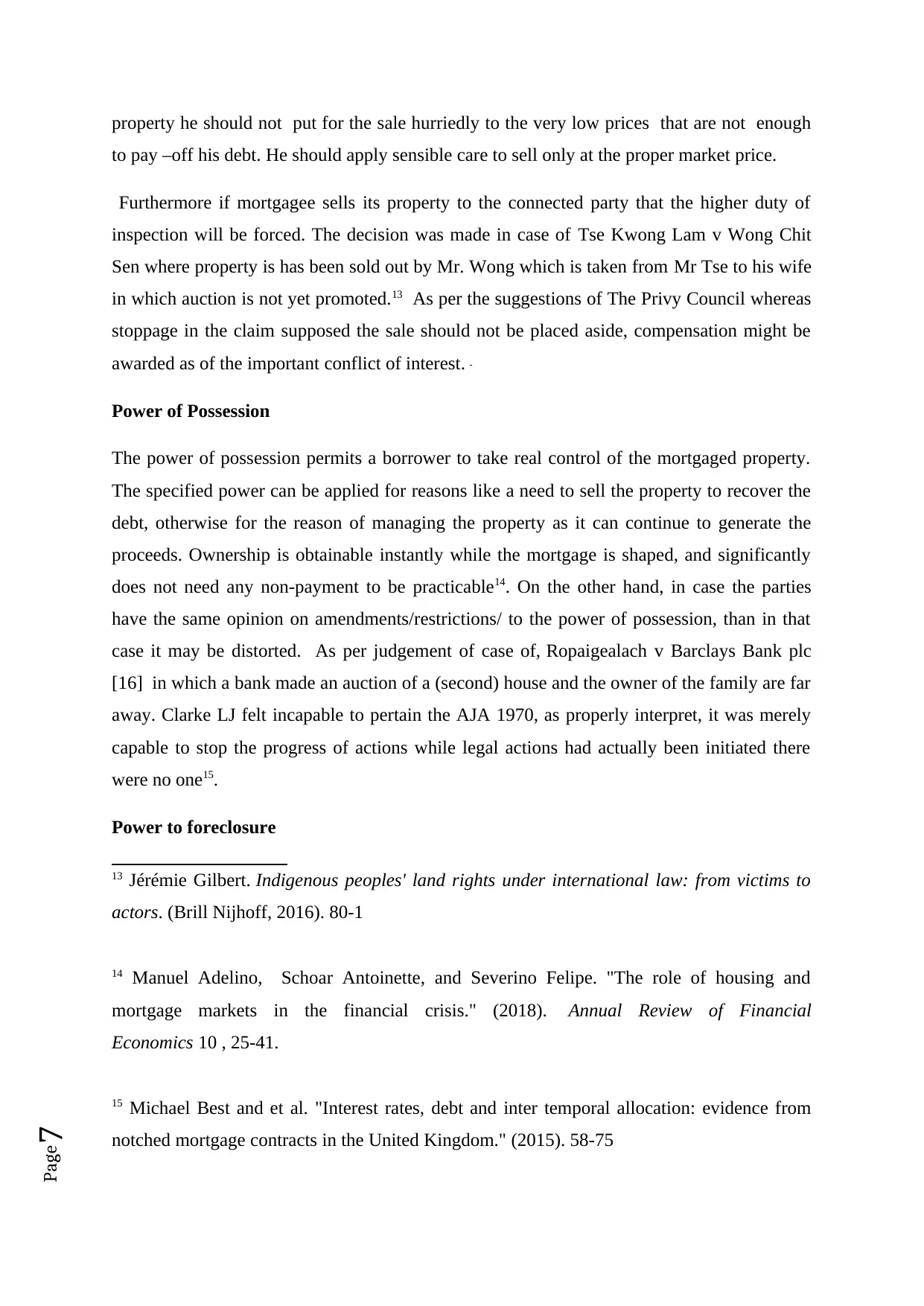
Page7
property he should not put for the sale hurriedly to the very low prices that are not enough
to pay –off his debt. He should apply sensible care to sell only at the proper market price.
Furthermore if mortgagee sells its property to the connected party that the higher duty of
inspection will be forced. The decision was made in case of Tse Kwong Lam v Wong Chit
Sen where property is has been sold out by Mr. Wong which is taken from Mr Tse to his wife
in which auction is not yet promoted.13 As per the suggestions of The Privy Council whereas
stoppage in the claim supposed the sale should not be placed aside, compensation might be
awarded as of the important conflict of interest.
Power of Possession
The power of possession permits a borrower to take real control of the mortgaged property.
The specified power can be applied for reasons like a need to sell the property to recover the
debt, otherwise for the reason of managing the property as it can continue to generate the
proceeds. Ownership is obtainable instantly while the mortgage is shaped, and significantly
does not need any non-payment to be practicable14. On the other hand, in case the parties
have the same opinion on amendments/restrictions/ to the power of possession, than in that
case it may be distorted. As per judgement of case of, Ropaigealach v Barclays Bank plc
[16] in which a bank made an auction of a (second) house and the owner of the family are far
away. Clarke LJ felt incapable to pertain the AJA 1970, as properly interpret, it was merely
capable to stop the progress of actions while legal actions had actually been initiated there
were no one15.
Power to foreclosure
13 Jérémie Gilbert. Indigenous peoples' land rights under international law: from victims to
actors. (Brill Nijhoff, 2016). 80-1
14 Manuel Adelino, Schoar Antoinette, and Severino Felipe. "The role of housing and
mortgage markets in the financial crisis." (2018). Annual Review of Financial
Economics 10 , 25-41.
15 Michael Best and et al. "Interest rates, debt and inter temporal allocation: evidence from
notched mortgage contracts in the United Kingdom." (2015). 58-75
property he should not put for the sale hurriedly to the very low prices that are not enough
to pay –off his debt. He should apply sensible care to sell only at the proper market price.
Furthermore if mortgagee sells its property to the connected party that the higher duty of
inspection will be forced. The decision was made in case of Tse Kwong Lam v Wong Chit
Sen where property is has been sold out by Mr. Wong which is taken from Mr Tse to his wife
in which auction is not yet promoted.13 As per the suggestions of The Privy Council whereas
stoppage in the claim supposed the sale should not be placed aside, compensation might be
awarded as of the important conflict of interest.
Power of Possession
The power of possession permits a borrower to take real control of the mortgaged property.
The specified power can be applied for reasons like a need to sell the property to recover the
debt, otherwise for the reason of managing the property as it can continue to generate the
proceeds. Ownership is obtainable instantly while the mortgage is shaped, and significantly
does not need any non-payment to be practicable14. On the other hand, in case the parties
have the same opinion on amendments/restrictions/ to the power of possession, than in that
case it may be distorted. As per judgement of case of, Ropaigealach v Barclays Bank plc
[16] in which a bank made an auction of a (second) house and the owner of the family are far
away. Clarke LJ felt incapable to pertain the AJA 1970, as properly interpret, it was merely
capable to stop the progress of actions while legal actions had actually been initiated there
were no one15.
Power to foreclosure
13 Jérémie Gilbert. Indigenous peoples' land rights under international law: from victims to
actors. (Brill Nijhoff, 2016). 80-1
14 Manuel Adelino, Schoar Antoinette, and Severino Felipe. "The role of housing and
mortgage markets in the financial crisis." (2018). Annual Review of Financial
Economics 10 , 25-41.
15 Michael Best and et al. "Interest rates, debt and inter temporal allocation: evidence from
notched mortgage contracts in the United Kingdom." (2015). 58-75
Paraphrase This Document
Need a fresh take? Get an instant paraphrase of this document with our AI Paraphraser
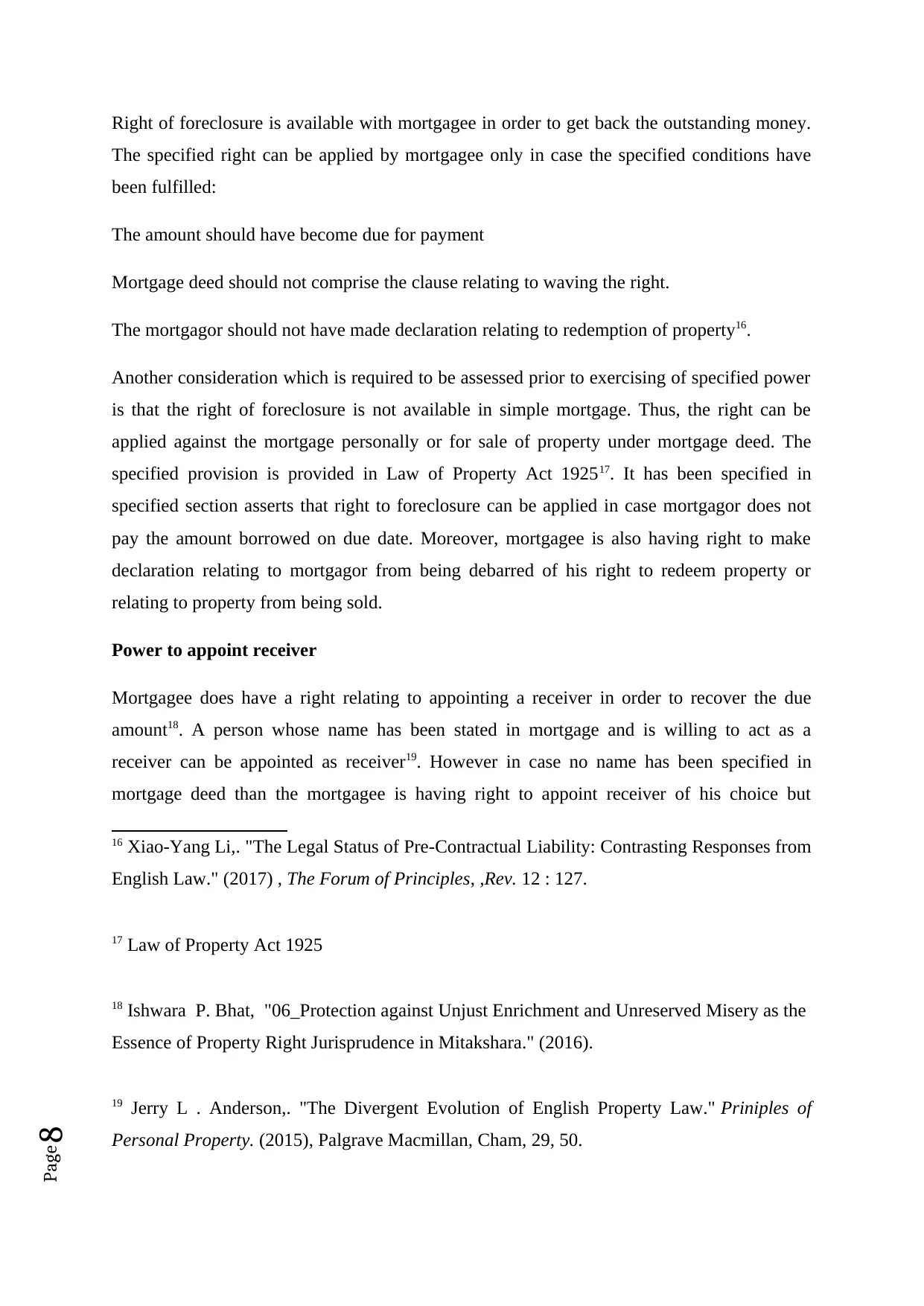
Page8
Right of foreclosure is available with mortgagee in order to get back the outstanding money.
The specified right can be applied by mortgagee only in case the specified conditions have
been fulfilled:
The amount should have become due for payment
Mortgage deed should not comprise the clause relating to waving the right.
The mortgagor should not have made declaration relating to redemption of property16.
Another consideration which is required to be assessed prior to exercising of specified power
is that the right of foreclosure is not available in simple mortgage. Thus, the right can be
applied against the mortgage personally or for sale of property under mortgage deed. The
specified provision is provided in Law of Property Act 192517. It has been specified in
specified section asserts that right to foreclosure can be applied in case mortgagor does not
pay the amount borrowed on due date. Moreover, mortgagee is also having right to make
declaration relating to mortgagor from being debarred of his right to redeem property or
relating to property from being sold.
Power to appoint receiver
Mortgagee does have a right relating to appointing a receiver in order to recover the due
amount18. A person whose name has been stated in mortgage and is willing to act as a
receiver can be appointed as receiver19. However in case no name has been specified in
mortgage deed than the mortgagee is having right to appoint receiver of his choice but
16 Xiao-Yang Li,. "The Legal Status of Pre-Contractual Liability: Contrasting Responses from
English Law." (2017) , The Forum of Principles, ,Rev. 12 : 127.
17 Law of Property Act 1925
18 Ishwara P. Bhat, "06_Protection against Unjust Enrichment and Unreserved Misery as the
Essence of Property Right Jurisprudence in Mitakshara." (2016).
19 Jerry L . Anderson,. "The Divergent Evolution of English Property Law." Priniples of
Personal Property. (2015), Palgrave Macmillan, Cham, 29, 50.
Right of foreclosure is available with mortgagee in order to get back the outstanding money.
The specified right can be applied by mortgagee only in case the specified conditions have
been fulfilled:
The amount should have become due for payment
Mortgage deed should not comprise the clause relating to waving the right.
The mortgagor should not have made declaration relating to redemption of property16.
Another consideration which is required to be assessed prior to exercising of specified power
is that the right of foreclosure is not available in simple mortgage. Thus, the right can be
applied against the mortgage personally or for sale of property under mortgage deed. The
specified provision is provided in Law of Property Act 192517. It has been specified in
specified section asserts that right to foreclosure can be applied in case mortgagor does not
pay the amount borrowed on due date. Moreover, mortgagee is also having right to make
declaration relating to mortgagor from being debarred of his right to redeem property or
relating to property from being sold.
Power to appoint receiver
Mortgagee does have a right relating to appointing a receiver in order to recover the due
amount18. A person whose name has been stated in mortgage and is willing to act as a
receiver can be appointed as receiver19. However in case no name has been specified in
mortgage deed than the mortgagee is having right to appoint receiver of his choice but
16 Xiao-Yang Li,. "The Legal Status of Pre-Contractual Liability: Contrasting Responses from
English Law." (2017) , The Forum of Principles, ,Rev. 12 : 127.
17 Law of Property Act 1925
18 Ishwara P. Bhat, "06_Protection against Unjust Enrichment and Unreserved Misery as the
Essence of Property Right Jurisprudence in Mitakshara." (2016).
19 Jerry L . Anderson,. "The Divergent Evolution of English Property Law." Priniples of
Personal Property. (2015), Palgrave Macmillan, Cham, 29, 50.
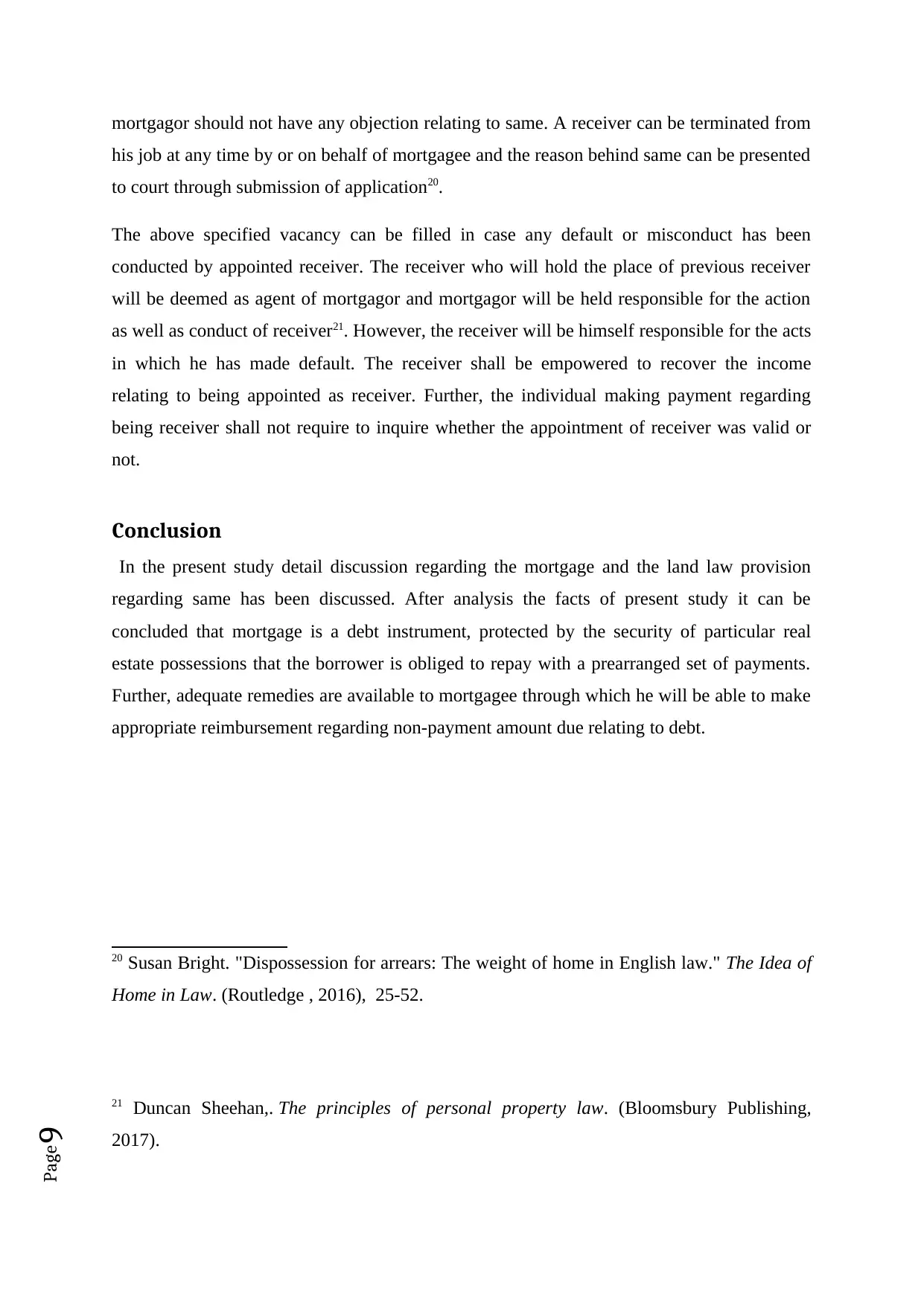
Page9
mortgagor should not have any objection relating to same. A receiver can be terminated from
his job at any time by or on behalf of mortgagee and the reason behind same can be presented
to court through submission of application20.
The above specified vacancy can be filled in case any default or misconduct has been
conducted by appointed receiver. The receiver who will hold the place of previous receiver
will be deemed as agent of mortgagor and mortgagor will be held responsible for the action
as well as conduct of receiver21. However, the receiver will be himself responsible for the acts
in which he has made default. The receiver shall be empowered to recover the income
relating to being appointed as receiver. Further, the individual making payment regarding
being receiver shall not require to inquire whether the appointment of receiver was valid or
not.
Conclusion
In the present study detail discussion regarding the mortgage and the land law provision
regarding same has been discussed. After analysis the facts of present study it can be
concluded that mortgage is a debt instrument, protected by the security of particular real
estate possessions that the borrower is obliged to repay with a prearranged set of payments.
Further, adequate remedies are available to mortgagee through which he will be able to make
appropriate reimbursement regarding non-payment amount due relating to debt.
20 Susan Bright. "Dispossession for arrears: The weight of home in English law." The Idea of
Home in Law. (Routledge , 2016), 25-52.
21 Duncan Sheehan,. The principles of personal property law. (Bloomsbury Publishing,
2017).
mortgagor should not have any objection relating to same. A receiver can be terminated from
his job at any time by or on behalf of mortgagee and the reason behind same can be presented
to court through submission of application20.
The above specified vacancy can be filled in case any default or misconduct has been
conducted by appointed receiver. The receiver who will hold the place of previous receiver
will be deemed as agent of mortgagor and mortgagor will be held responsible for the action
as well as conduct of receiver21. However, the receiver will be himself responsible for the acts
in which he has made default. The receiver shall be empowered to recover the income
relating to being appointed as receiver. Further, the individual making payment regarding
being receiver shall not require to inquire whether the appointment of receiver was valid or
not.
Conclusion
In the present study detail discussion regarding the mortgage and the land law provision
regarding same has been discussed. After analysis the facts of present study it can be
concluded that mortgage is a debt instrument, protected by the security of particular real
estate possessions that the borrower is obliged to repay with a prearranged set of payments.
Further, adequate remedies are available to mortgagee through which he will be able to make
appropriate reimbursement regarding non-payment amount due relating to debt.
20 Susan Bright. "Dispossession for arrears: The weight of home in English law." The Idea of
Home in Law. (Routledge , 2016), 25-52.
21 Duncan Sheehan,. The principles of personal property law. (Bloomsbury Publishing,
2017).
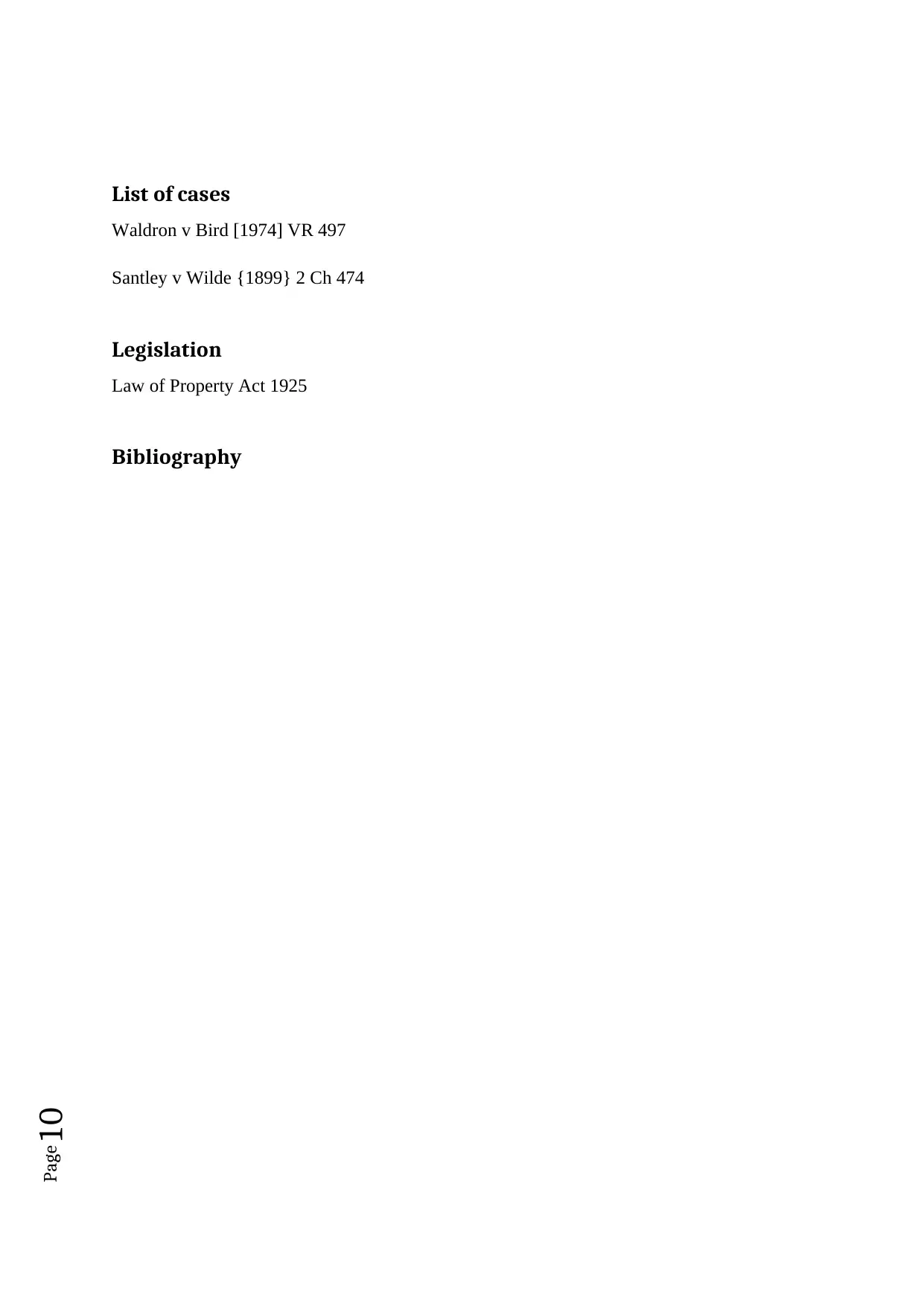
Page10
List of cases
Waldron v Bird [1974] VR 497
Santley v Wilde {1899} 2 Ch 474
Legislation
Law of Property Act 1925
Bibliography
List of cases
Waldron v Bird [1974] VR 497
Santley v Wilde {1899} 2 Ch 474
Legislation
Law of Property Act 1925
Bibliography
Secure Best Marks with AI Grader
Need help grading? Try our AI Grader for instant feedback on your assignments.
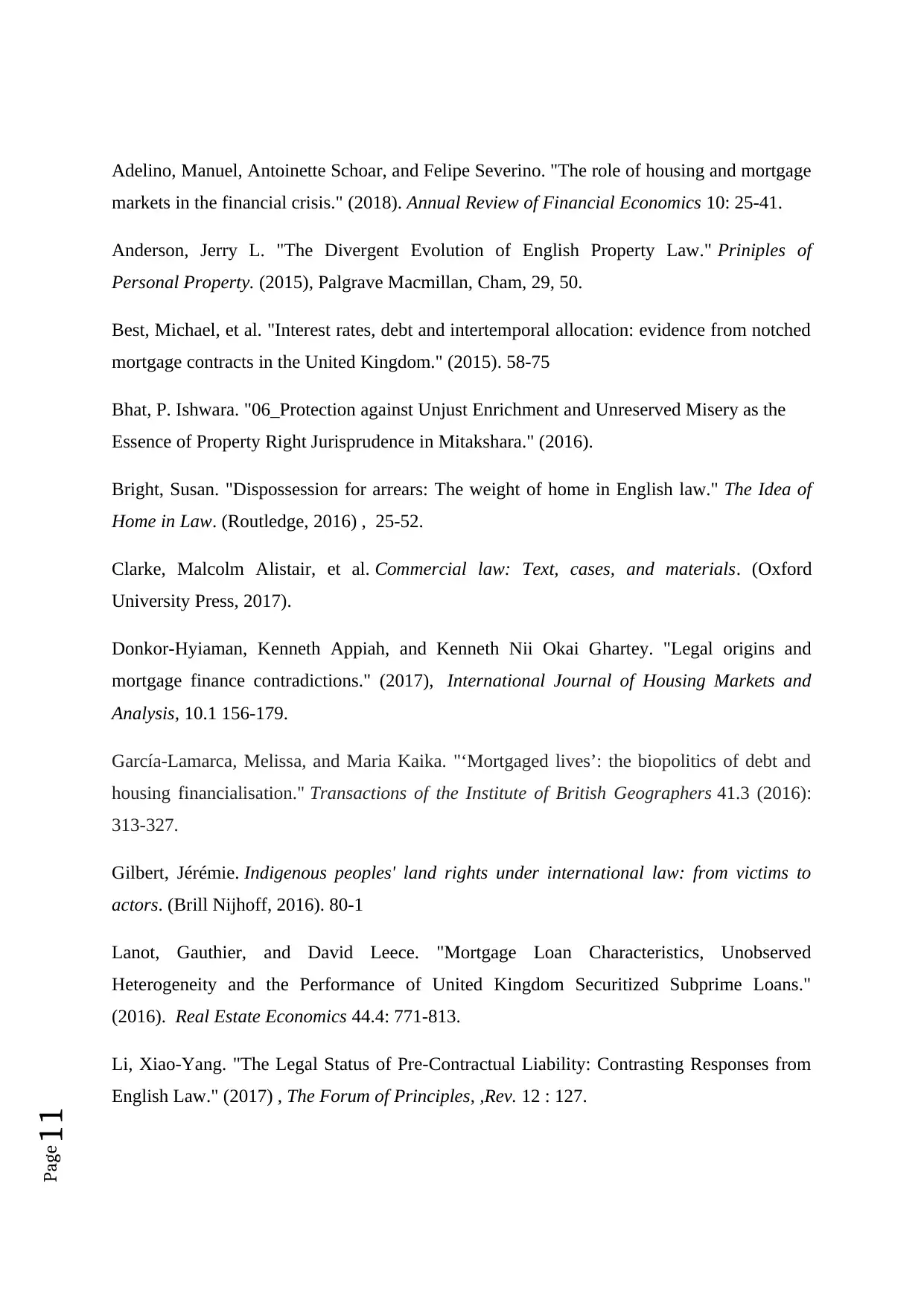
Page11
Adelino, Manuel, Antoinette Schoar, and Felipe Severino. "The role of housing and mortgage
markets in the financial crisis." (2018). Annual Review of Financial Economics 10: 25-41.
Anderson, Jerry L. "The Divergent Evolution of English Property Law." Priniples of
Personal Property. (2015), Palgrave Macmillan, Cham, 29, 50.
Best, Michael, et al. "Interest rates, debt and intertemporal allocation: evidence from notched
mortgage contracts in the United Kingdom." (2015). 58-75
Bhat, P. Ishwara. "06_Protection against Unjust Enrichment and Unreserved Misery as the
Essence of Property Right Jurisprudence in Mitakshara." (2016).
Bright, Susan. "Dispossession for arrears: The weight of home in English law." The Idea of
Home in Law. (Routledge, 2016) , 25-52.
Clarke, Malcolm Alistair, et al. Commercial law: Text, cases, and materials. (Oxford
University Press, 2017).
Donkor-Hyiaman, Kenneth Appiah, and Kenneth Nii Okai Ghartey. "Legal origins and
mortgage finance contradictions." (2017), International Journal of Housing Markets and
Analysis, 10.1 156-179.
García‐Lamarca, Melissa, and Maria Kaika. "‘Mortgaged lives’: the biopolitics of debt and
housing financialisation." Transactions of the Institute of British Geographers 41.3 (2016):
313-327.
Gilbert, Jérémie. Indigenous peoples' land rights under international law: from victims to
actors. (Brill Nijhoff, 2016). 80-1
Lanot, Gauthier, and David Leece. "Mortgage Loan Characteristics, Unobserved
Heterogeneity and the Performance of United Kingdom Securitized Subprime Loans."
(2016). Real Estate Economics 44.4: 771-813.
Li, Xiao-Yang. "The Legal Status of Pre-Contractual Liability: Contrasting Responses from
English Law." (2017) , The Forum of Principles, ,Rev. 12 : 127.
Adelino, Manuel, Antoinette Schoar, and Felipe Severino. "The role of housing and mortgage
markets in the financial crisis." (2018). Annual Review of Financial Economics 10: 25-41.
Anderson, Jerry L. "The Divergent Evolution of English Property Law." Priniples of
Personal Property. (2015), Palgrave Macmillan, Cham, 29, 50.
Best, Michael, et al. "Interest rates, debt and intertemporal allocation: evidence from notched
mortgage contracts in the United Kingdom." (2015). 58-75
Bhat, P. Ishwara. "06_Protection against Unjust Enrichment and Unreserved Misery as the
Essence of Property Right Jurisprudence in Mitakshara." (2016).
Bright, Susan. "Dispossession for arrears: The weight of home in English law." The Idea of
Home in Law. (Routledge, 2016) , 25-52.
Clarke, Malcolm Alistair, et al. Commercial law: Text, cases, and materials. (Oxford
University Press, 2017).
Donkor-Hyiaman, Kenneth Appiah, and Kenneth Nii Okai Ghartey. "Legal origins and
mortgage finance contradictions." (2017), International Journal of Housing Markets and
Analysis, 10.1 156-179.
García‐Lamarca, Melissa, and Maria Kaika. "‘Mortgaged lives’: the biopolitics of debt and
housing financialisation." Transactions of the Institute of British Geographers 41.3 (2016):
313-327.
Gilbert, Jérémie. Indigenous peoples' land rights under international law: from victims to
actors. (Brill Nijhoff, 2016). 80-1
Lanot, Gauthier, and David Leece. "Mortgage Loan Characteristics, Unobserved
Heterogeneity and the Performance of United Kingdom Securitized Subprime Loans."
(2016). Real Estate Economics 44.4: 771-813.
Li, Xiao-Yang. "The Legal Status of Pre-Contractual Liability: Contrasting Responses from
English Law." (2017) , The Forum of Principles, ,Rev. 12 : 127.
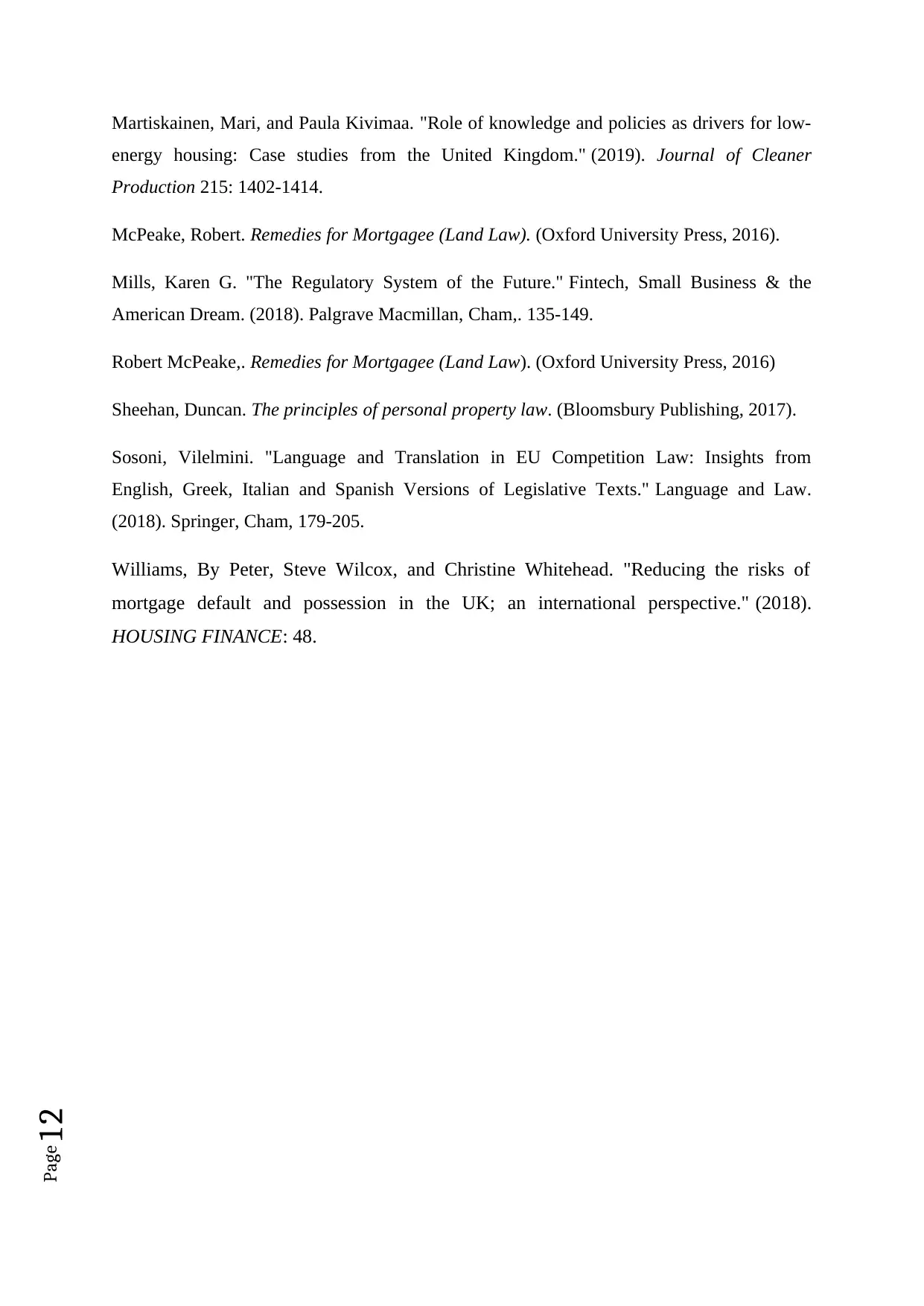
Page12
Martiskainen, Mari, and Paula Kivimaa. "Role of knowledge and policies as drivers for low-
energy housing: Case studies from the United Kingdom." (2019). Journal of Cleaner
Production 215: 1402-1414.
McPeake, Robert. Remedies for Mortgagee (Land Law). (Oxford University Press, 2016).
Mills, Karen G. "The Regulatory System of the Future." Fintech, Small Business & the
American Dream. (2018). Palgrave Macmillan, Cham,. 135-149.
Robert McPeake,. Remedies for Mortgagee (Land Law). (Oxford University Press, 2016)
Sheehan, Duncan. The principles of personal property law. (Bloomsbury Publishing, 2017).
Sosoni, Vilelmini. "Language and Translation in EU Competition Law: Insights from
English, Greek, Italian and Spanish Versions of Legislative Texts." Language and Law.
(2018). Springer, Cham, 179-205.
Williams, By Peter, Steve Wilcox, and Christine Whitehead. "Reducing the risks of
mortgage default and possession in the UK; an international perspective." (2018).
HOUSING FINANCE: 48.
Martiskainen, Mari, and Paula Kivimaa. "Role of knowledge and policies as drivers for low-
energy housing: Case studies from the United Kingdom." (2019). Journal of Cleaner
Production 215: 1402-1414.
McPeake, Robert. Remedies for Mortgagee (Land Law). (Oxford University Press, 2016).
Mills, Karen G. "The Regulatory System of the Future." Fintech, Small Business & the
American Dream. (2018). Palgrave Macmillan, Cham,. 135-149.
Robert McPeake,. Remedies for Mortgagee (Land Law). (Oxford University Press, 2016)
Sheehan, Duncan. The principles of personal property law. (Bloomsbury Publishing, 2017).
Sosoni, Vilelmini. "Language and Translation in EU Competition Law: Insights from
English, Greek, Italian and Spanish Versions of Legislative Texts." Language and Law.
(2018). Springer, Cham, 179-205.
Williams, By Peter, Steve Wilcox, and Christine Whitehead. "Reducing the risks of
mortgage default and possession in the UK; an international perspective." (2018).
HOUSING FINANCE: 48.
1 out of 12
Related Documents
Your All-in-One AI-Powered Toolkit for Academic Success.
+13062052269
info@desklib.com
Available 24*7 on WhatsApp / Email
![[object Object]](/_next/static/media/star-bottom.7253800d.svg)
Unlock your academic potential
© 2024 | Zucol Services PVT LTD | All rights reserved.





